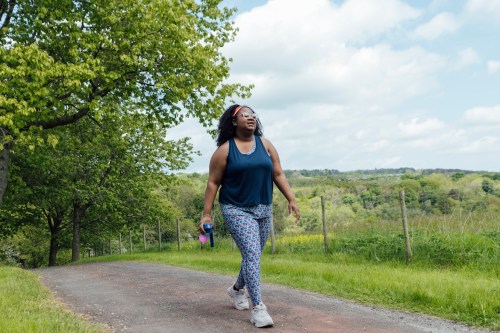Here’s How Many Minutes You Need To Walk Daily To Cut Your Risk of Heart Disease by 30%
An analysis from Harvard Health found that heart benefits of walking include decreasing heart disease risk by a third. Here’s why.

From pumping your system full of mood-boosting endorphins to building muscular endurance to optimizing your oxygen uptake, the benefits of aerobic exercise (and yes, that includes the benefits of walking) are numerous, especially when it comes to keeping your heart healthy.
Experts in This Article
cardiac surgeon and director of cardiac transplantation at the Sandra Atlas Bass Heart Hospital at North Shore University Hospital in Manhasset, New York
Not to get too morbid, but heart disease is the leading cause of death among Americans, according to the Centers for Disease Control (CDC). On the bright side, though, walking is one of the best ways to show your ticker some TLC.
In fact, there are few better ways to ensure your own heart health than through the simple act of walking. Tom Frieden, MD, former director of the CDC, told Harvard Health that it’s “the closest thing we have to a wonder drug.” No prescription required. (So, yes, in case you were wondering, walking is enough exercise.)
How much do you have to walk to lessen your risk of heart disease?
But how much time on your feet is necessary to reap those heart benefits of walking? “Walking for 2.5 hours a week—that’s just 21 minutes a day—can cut your risk of heart disease by 30 percent,” according to a review by Harvard Medical School that synthesized research on the topic.
Put another way, a 30 minute walk five times a week will improve your heart’s odds by a third in the long run. That’s roughly a mile a day, according to 2019 research in JAMA Open Network1 that found the average time it takes to walk a mile is 15 to 22 minutes.
How does walking improve your heart health, anyway?
Cardiac surgeon Brian Lima, MD, explains that the benefits to your heart come by “reducing risk factors for heart disease that include elevated cholesterol, blood pressure, obesity, and diabetes.”
Essentially, your likelihood of developing heart disease goes up when you have conditions that walking can help prevent. So walking attacks the root cause of the problem by strengthening your heart, as well as making you an overall healthier person by putting your body at less risk. This may also help improve your life expectancy after a heart attack by age.
It’s also one of the easiest exercise habits to adopt. You can go for a jaunt around the block or take a visit to your neighborhood coffee shop, like this editor who turned morning walks into her a.m. caffeine ritual—and reaped major benefits, aside from strengthening her heart. Or, you can spice things up with hills and intervals. Either way, lacing up some walking shoes—like the fashion-forward Hoka—will help you get the most out of your mileage (and your heart).
And ultimately, taking care of your heart in all ways can help reduce your risk of cardiac events, like heart attack and stroke. It’s important to know all the warning signs and symptoms, including how long a heart attacks lasts (which can be minutes to hours if you don’t receive proper care). If you feel intense chest pain that doesn’t go away, call your doctor and get to the ER ASAP.
FAQ
1. Will walking make your heart stronger?
Walking ups your heart rate, betters your circulation, and lowers your blood pressure, according to UCLA Health. This, in turn, makes your heart stronger and healthier. So keep logging those miles!
2. Is it better to walk faster or longer?
Whether you walk faster or longer, you’ll reap health benefits either way.
“Speed gets you more bang for the buck if you have limited time to exercise,” sports cardiologist John Higgins, MD, previously told Well+Good. “About 15 minutes of high intensity [walking] a day equals about 30 minutes of moderate intensity.”
But if you don’t feel like being speedy and a chill, leisurely walk is more your vibe, that’s totally okay. Dr. Higgins says a longer walk still offers the same heart health advantages.
“I recommend doing at least one high-intensity workout per week, or every other week. On the rest of the days, do your moderate workouts,” Dr. Higgins said.
3. What other activities support a healthy heart?
According to the CDC, any moderate- or high-intensity form of aerobic exercise that gets your heart rate up benefits your ticker. So, aside from daily walking for heart health, this includes anything from mowing your lawn to dancing to your favorite song to riding your bike to beating your bestie in a game of pickleball.
Rasmussen LJH, Caspi A, Ambler A, Broadbent JM, Cohen HJ, d’Arbeloff T, Elliott M, Hancox RJ, Harrington H, Hogan S, Houts R, Ireland D, Knodt AR, Meredith-Jones K, Morey MC, Morrison L, Poulton R, Ramrakha S, Richmond-Rakerd L, Sison ML, Sneddon K, Thomson WM, Hariri AR, Moffitt TE. Association of Neurocognitive and Physical Function With Gait Speed in Midlife. JAMA Netw Open. 2019 Oct 2;2(10):e1913123. doi: 10.1001/jamanetworkopen.2019.13123. PMID: 31603488; PMCID: PMC6804027.
↩︎










